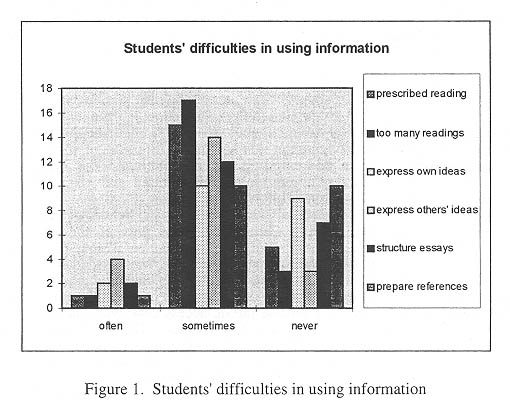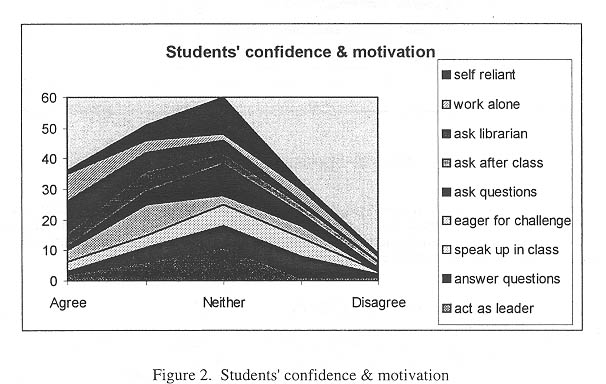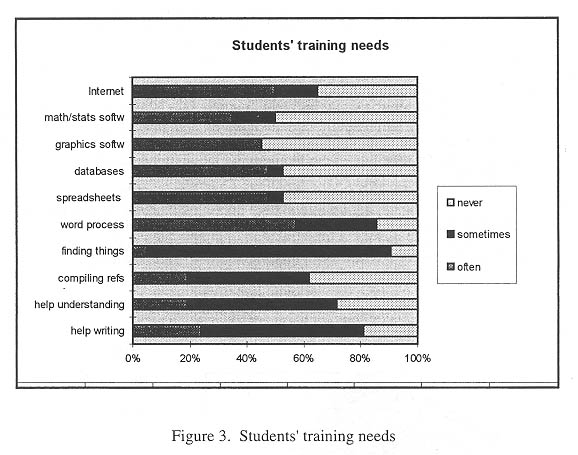
Karin de Jager
Mary Nassimbeni
School of Librarianship
University of Cape Town
Cape Town, South Africa
E-mail: kdej@education.uct.ac.za
This paper will discuss an attempt made by the School of Librarianship at the University of Cape Town (UCT) to address the need for training engendered by the information revolution, that is also appropriate in the developing world. Students from historically disadvantaged educational systems have not been exposed to information sources and technologies that require or foster the development of confidence or skill in these areas. The UCT School of Librarianship is offering a single semester course with the specific aim of providing students with transferable learning and information skills, to undergraduate students in the Faculty of Social Sciences and Humanities. A questionnaire was also administered to those students who took the course. This paper share the results of this investigation, together with the experience of the teaching participants.
The status of the nation's information literacy has been placed high on the national agenda of the new South Africa. Deputy President Thabo Mbeki has on a number of occasions including very visible international platforms expressed the government's commitment to using an expanded and modern information infrastructure to support the goals of economic growth and national reconstruction and development. The government's position paper, The Information Society and the Developing World: A South African Approach, delivered at the Information Society and the Development (ISAD) Conference held in South Africa in May 1996 clearly recognizes the importance of training to enable all citizens to participate in the Information Society. The paper refers to "nation-wide 'fast-track' inculcation of computer and information skills in the population [as a] major task requiring organizational commitment and funding" (South African Government for the Information Society and Development (ISAD) Conference, 1996, p. 52).
These concerns for human resource development to empower people to function within the context of rapid and continuous change characteristic of the Information Society resonate in developments in the higher education sector. The recently published policy framework for the higher education sector, An Overview of A New Policy Framework for Higher Education Transformation prepared by the National Commission on Higher Education (NCHE) for the Minister of Education isolates globalization as one of the powerful factors influencing the future direction of tertiary education. The report refers to the importance of the transferable skills required by the learning society of all graduates:
2. INFORMATION LITERACY AT THE UNIVERSITY OF CAPE TOWN
The importance of information literacy at University of Cape Town (UCT) was recently recognized at the highest level, when an important policy statement in the UCT Academic Plan expressly noted the University's commitment to lifelong learning, which it explained as follows:
The School of Librarianship at the UCT had for some time been considering ways in which to address this need for enhanced information literacy education. The School therefore negotiated with the Faculty of Social Sciences and Humanities, where such an initiative was encouraged by the Dean, to offer a single semester course to undergraduates with the specific aim of providing students with transferable learning and information skills. The course is known as "Information Society: Tools and Skills" and endeavors to assist students in obtaining insight into their information needs and the ability to deal with such needs critically and resourcefully.
The course was taught for the first time during the second semester, July to October of 1996. It was accessible to any undergraduate student from this Faculty wishing to obtain credit for a one semester course. Some 30 students enrolled for the course, which is still in process. As the aim of this paper was to attempt to extract objective measures of the impact of the course on student learning, only an interim analysis of what has been done and found to date, half-way through the semester, will be provided. A fuller evaluation will be presented at the Conference, when the course will have been completed.
2.1. Course Details and Objectives
The course aimed to provide an introduction to the information age and its impact on society. It was envisaged that participation should enable students to understand the functioning of the information society and to navigate the vast amount of information with which they are frequently confronted. Issues addressed in lectures included the organization and compilation of information, its presentation in both printed and electronic databases, networks, searching and the evaluation of information.
The course is part of an experiment in team teaching by the School of Librarianship, the University Libraries and the Writing Center, which is part of the UCT Academic Development Program. An important component is the regular, weekly practical sessions, coordinated by members of the UCT library service and the Writing Center. The practicals were directed at searching, selecting, retrieving and evaluating information from both printed and electronic sources. Each student had the opportunity to complete both introductory and more advanced sessions on the UCT on-line public access catalogue, on printed reference sources, on CD-ROM reference sources and the Internet. They also attended a project writing workshop mediated by the Writing Center. As the students are all from the Faculty of Social Science and Humanities, practical questions and examples were specifically directed at information sources in the broad area of the social sciences.
A longer project, which requires that students make use of all the skills they learnt during practical sessions, will count towards 30% of their final marks. For this project the students were given a topic "Censorship and the Internet" and they were firstly required to define the issues involved, then to retrieve relevant references from the on-line catalogue and journal articles from the CD-ROM sources. The items then had to be physically retrieved and evaluated. Finally, an essay discussing the topic and its implications had to be written.
It was originally envisaged that the course could appeal particularly to students from disadvantaged academic backgrounds in their first or second years at university and that it could assist them in benefiting more from tertiary education. A demographic analysis of the course participants, indicated that fewer than 20% come from the "advantaged" schools in the country and that the course had indeed reached its target population to a considerable extent.
2.2. Early findings
At the beginning of the course, a questionnaire was administered to the entire class, to measure pre-existing information skills and experiences of teaching at tertiary education level. Apart from questions about details such as age, gender and school systems where respondents came from, the questionnaire attempted to establish perceived competencies in studying, in the writing of essays and other research assignments, and respondents' library and computer skills. The questionnaires were completed by 21 students.
Questions directed at establishing whether students have difficulty in coping with learning demands at university, seemed to indicate that they indeed believe that they struggle: 82% thought that they were at times given too many readings with which to cope, and had difficulties in expressing other writers' ideas in their own words. 73% thought that prescribed readings were often or at least sometimes difficult to understand. In addition, Figure 1 illustrates the extent to which students had difficulty in expressing their own ideas or those of other writers in their own words, problems with structuring essays, and with preparing lists of references to attach to their written work.

Both computer access and computer competence were investigated. While 62% had access to a computer for their own use, only 29% had such access on campus and 19% had access to the Internet. (It should be emphasized here that UCT does not normally provide Internet access to undergraduate students other than in the Commerce and Engineering Faculties, where all students have such access.)
While all new students at UCT are supposed to attend a library orientation session, only 57% said they had done so. 38% had attended a course on study skills and 10% more advanced library instruction sessions on specific finding tools and skills. The use they made of the library seemed limited to the short loan collection, which 57% said they used at least once a week, and to consulting the computer catalogue, which 48% used that frequently. A further 24% and 29% respectively claimed to use them at least once per month. The card catalogue and surprisingly, the CD-ROM installations, were used least frequently as between 64% (card catalogue) and 77% (CD-ROM) of respondents claimed that they never or hardly ever used those tools.
Computer skills seemed primarily limited to word-processing. While 81% claimed some familiarity with a computer operating system such as MS-DOS or Windows, and also with a word processing package, only 19% or fewer had at least some experience of spreadsheet or database packages. 24% claimed some experience with multimedia packages on CD-ROM, while 57% said that they would like to be able to use such packages. There also seemed to be a need for access to spreadsheet, database, graphics, computer-aided design and statistical software packages, as between 71% and 86% of respondents stated that they would like to be able to use them.
The literature on information literacy also suggests that, for students to be confident and capable of navigating their way through the information society, a certain competency in the "affective domain" should be present (Nahl Jakobowits and Jacobovits, 1993). Students should be sufficiently motivated and curious to engage effectively with the world of information. A number of questions were therefore included in the questionnaire to test this affective component.
These questions were framed on a verbal expression
rating scale and addressed issues such as confidence about speaking up
and asking questions in class, willingness to tackle challenging assignments,
asking librarians for assistance and preferring to work alone or in groups.
Figure 2 illustrates that by choosing the most non-committal responses,
they do not feel particularly motivated or confident to engage actively
in class or with their work.

As this group of students had enrolled in a course which claimed that it would enhance their skills in finding information and in using information technology, particular attention was paid to a series of questions about the students' perceived needs for assistance in these areas. The questionnaire therefore inquired whether students had felt a need for help with a number of activities associated with learning at the level of tertiary education.
Figure 3 illustrates that this group of students apparently feel that their most important need is to be able to use word-processing software; an issue that was not addressed by the course, but clearly one which will have to be looked into when it is repeated next year. If one accepts that "sometimes" responses also indicate an expression of some need, Internet training, help with finding things in the library and assistance with writing essays or assignments all feature prominently as needs perceived by students.

A final, open-ended question asked respondents to note any further comments about any of the issues raised in the questionnaire. Three responses were received: two expressing the need for more training in information technology and one complaining of the difficulty of physically finding items in the library after having located them in the catalogue.
3. DISCUSSION AND CONCLUSION
The results of the questionnaire seemed to confirm that the undergraduate students at UCT that were attracted to this course, are neither information literate or information confident to a significant extent. An important outcome of the course, therefore, would be an assessment of the extent to which the course actually affected or influenced their information literacy. In order to test this, a subjective student evaluation of the impact of the course will be elicited in a follow-up questionnaire which will be used in conjunction with examination results, class work and project marks to evaluate the outcome of the course. This evaluation investigation will pay particular attention to the issues addressed above and will attempt to establish whether there has been any significant improvement in areas that were identified as problematic. The results of this second evaluation will be discussed at the Conference.
It is further envisaged that the course materials
that were generated, will be made available to interested departments or
faculties in any of the institutions forming part of the CALICO consortium.
The INFOLIT project is at present investigating the possibility of establishing
foundation courses in information literacy on the five campuses and part
of the funding received for this project will be spent on generating web-accessible
course notes which would be available electronically to anyone in the CALICO
institutions, for information or revision purposes.
REFERENCES
Nahl Jakobovits, D. and Jacobovits, L.A. (1993). Bibliographic instructional design for information literacy: integrating affective and cognitive objectives. Research strategies, 11 (2): 73-88.
South African Government for the Information Society and Development (ISAD) Conference. (1996). The Information Society and the Developing World: a South African Approach. Paper prepared by the South African Government for the Information Society and Development (ISAD) Conference, Midrand, May 1996.
South Africa. National Commission on Higher Education. (1996). An overview of a new policy framework for Higher Education transformation. Available at http://star.hsrc.ac.za/nche/press/policy.html
South Africa. National Commission on Higher Education. Working Group on Libraries and Information Technology. (1996). Policy, Planning and Cooperation: Smart Solutions for Information Provision. Pretoria: NCHE.
University of Cape Town. (1996, March). Academic
Planning Committee. Academic planning Framework. Interim report
for discussion.